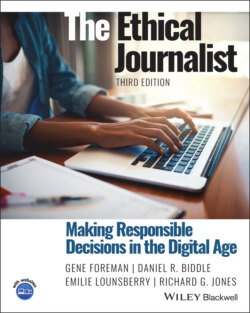Читать книгу The Ethical Journalist - Gene Foreman - Страница 70
How to Respond to the Criticism
ОглавлениеThe incessant criticism in the surveys might tempt journalists to conclude that, since there is no way to please the public, why even try?
That would be a mistake. Journalists must take their credibility very seriously. Whether they think readers, viewers, and listeners are right or wrong, they ignore the audience’s opinions at their peril.
People who make complaints about the news ultimately may not get satisfaction. The owners of some department stores used to tell their employees that “the customer is always right” – a policy that may be smart in retailing but not in news. The final resolution of a complaint is determined by the facts, not by what would make the customer happy.
Of course, the customer isn’t always wrong, either. A reasonable customer – not one who calls for the sole purpose of mindless screaming – is entitled to serious consideration of a complaint of inaccuracy. The news organization’s proper response is, “We’ll check it out.”
If the complaint proves valid, the news organization should speedily correct the record. In addition, the journalists ought to analyze how the error occurred. That could lead them to improve their procedures of gathering and presenting the news.
If, however, the investigation shows the original report was correct, the news organization should explain its decision‐making. Citizen critics often are astonished, and pleased, that the news organization would take the time to address their complaints in a thoughtful way. If the critic’s point of view is widely shared, a way could be found – a letter to the editor or a comment posted online – to accommodate customers who want to explain their perspective.
In the digital era, members of the audience can and often do take matters into their own hands when they feel slighted by a news organization. Using social media and blogs, they express their displeasure in messages that may go viral. That is what happened in the case study accompanying this chapter, “A Journalist’s Trial by Social Media.”
No matter how their motives are misunderstood, journalists must not consciously do anything that would validate the criticism and justify the lack of trust.
Nor should journalists pander to the public – shaping the news to fit the perceived desires of the audience. In the first place, the public is far from monolithic, and no one can precisely determine what it wants to be told about a news event. Far more important, journalists would be betraying their audience’s trust by making popularity their goal instead of an honest search for truth.
In short, journalists:
have to accept that they are not going to be loved by their audience, but …
can’t stop trying to improve their credibility in the eyes of the public.
Nobody said this job was going to be easy!
